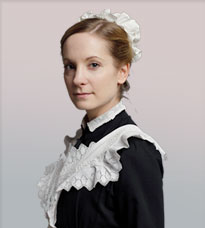
The irresistible series, Downton Abby, touted as an “instant classic” by the New York Times, is airing on Masterpiece Theatre on Sunday nights in January on PBS. This is a revision of the extremely popular Upstairs, Downstairs that ran in England for years in the 70’s, and is all about boundaries.The upper class family upstairs and the other whole world of the servants below, and the class line between them is an education for all nannies and household staff. As World War One begins, the boundaries are abruptly softened.
Lady Mary Crawley asks Anna, the Head Housemaid, for advice in her love life and Anna demurely replies that it would not be for her to say, but she does instructively convey how she feels about her own lost love: “There will never be another for me.” And when a visiting military commander is threatened by the spirited Irish chauffeur, Branson, the message must go through a ladder of servant levels until Mr Carson, the butler deftly and smoothly averts the attack without any of the dinner guests realizing what just happened, while we’re sweating it out watching.
Understanding boundaries, called “that magic line” which is never to be crossed, by the real world famous butler, Charles McPhearson, is key to the domestic professional, whether a nanny, mother’s helper, baby nurse, chef, personal assistant, butler or estate manager.
One of the many reasons why Caring Nannies only interviews candidates who have 2-3 years
of nanny experience is that they have experience distinguishing these important boundaries. The home environment is fraught with grey areas.A less experienced nanny will not pick up cues when she should melt away or not give an opinion.
Years ago, I helped several families as a baby nurse, and would often touch base with the mom when I came in. One evening, when I came in the Mom was chatting with a friend and I sat down on the couch to visit with them. The ladies froze, and I realized I’d missed a cue.
One of our nannies was a live-in nanny for an NBA player, and when just she and the Mom were together, they were best friends. But when visitors arrived, the nanny was instantly relegated to the ‘servant’ role. An experienced professional will take this in stride and not take it personally.
It’s challenging, because what we love to hear when collecting references is: “She became like part of the family.” That’s what we all want. We want someone to care for our children and homes as though it were their own. But at the end of the day, they do go home. Accomplishing this balance takes the finesse of a tightrope walker, but this is one way that nannies and domestic staff are completely different from any other professional. The exxperienced ones get it. We’ve had nannies fired for working out in the master bedroom (it was the mirrored closet doors that inspired her), for giving unwarranted advice, and for following their own protocol rather than the parents.
Tips for nannies and household staff:
Remember that the employer is the boss, and they are paying you to follow their preferences.
Assume that the family needs lots of space and boundaries. They are not hiring a friend. Don’t chit-chat with them about your life. If you’re asked a question that crosses your boundaries, deflect it sweetly with a smile. Be friendly and professional.

If you have concerns or see a better way of doing something, bring up those concerns privately, not in front of the children or others. If they are not open, drop it and cheerfully continue with their way. In general, give no unsolicited advice unless the children are in danger. As one of our Moms’ reiterated last week, “If you feel you have a better way of doing something, please do it my way or come to me and let’s talk about it.” Your job is to discern needs spoken and unspoken and work with a servant’s heart so that when the employee walks through the door at day’s end, they are free to enjoy their children and home knowing that the major issues of the day have been dealt with.
The longer you’ve been a professional and the more you know, the harder it will be for you to do it their way unless you have that essential servant’s heart. You’ll be accustomed to doing things the way you know is best. Also, you have the recent experience of your last
family, and will naturally want to have the same kind of relationship/ rules/experience that you had before. Be ready to adjust to the new family worldview. Remember: Expectations ruin relationships.
How the family can help:
Be precise in your expectations, definite about messes and schedules. You’re the boss, so be assertive about it. Not easy for most of us. Start the relationship with a written agreement that details duties, hours pay, how discipline is to be handled, mileage compensation, family rules, etc.
It is difficult to become friends with your nanny or housekeeper and then come to them with problem or constructive criticism. Be warm and friendly, but keep back a bit of reserve. The best scenario is when you truly like the person you’ve hired, and you do feel like they could be your friend or a family member, since they are rendering such a vital service to your family.
Schedule formal monthly meetings with your nanny. Obviously, you will touch base daily or weekly, but these longer, more structured meetings will give you an opportunity to take more time to de-clutter any problems in the relationship. A shy caregiver may need more time to open up, and you may need moments of silence to share what is bothering you as well. Caring Nannies has tools that can help, but you have to opt into a monthly email reminder. We provide tips on how to get started, annual and semi-annual performance reviews and much much more!
